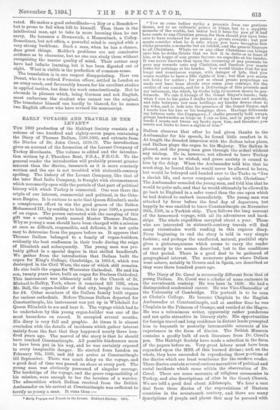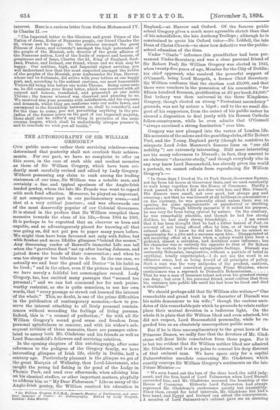EARLY VOYAGES AND TRAVELS IN THE LEVANT.* Tun 1893 production
of the Hakluyt Society consists of a volume of two hundred and eighty-seven pages, containing the Diary of Thomas Dallam, 1599-1600, and extracts from the Diaries of Dr. John Covel, 1670-79. The introduction gives an account of the formation of the Levant Company of Turkey Merchants. The volume is edited and the introduc. lion written by J. Theodore Bent, F.S.A., F.R.G.S. To the general reader the introduction will probably present greater interest than the diaries, inasmuch as it is more concisely written and the eye is not troubled with sixteenth-century spelling. The history of the Levant Company, like that of the later East India Company, is fraught with circumstances which necessarily open wide the portals of that part of political history with which Turkey is connected. One sees there the origin of our interest, commercial and political, in the Otto- man Empire. It is curious to note that Queen Elizabeth made a conspicuous effort to win the good graces of the Sultan Mohammed III., by sending to him, in the year 1599, a present of an organ. The person entrusted with the carrying of this gift was a certain youth named Master Thomas Dallam. Why so young a man should have been charged with a mission at once so difficult, responsible, and delicate, it is not quite easy to determine from the papers before us. It appears that Thomas Dallam belonged to a family of organ-builders, evidently the best craftsmen in their trade during the reign of Elizabeth and subsequently. The young man was pro- bably gifted in a special degree in that skilled handicraft. We gather from the introduction that Dallam built the organ for King's College, Cambridge, in 1605-6, which was destroyed in the Civil Ware, the case of which still remains. He also built the organ for Worcester Cathedral. He and hie son, twenty years later, built an organ for Durham Cathedral. This instrument was ultimately sold to the Church of St. Michael-le-Belfry, York, where it remained till 1885, when Mr. Bell, the organ-builder of that city, bought its remains for BC Other members of the Dallam family built organs for various cathedrals. Before Thomas Dallam departed for Constantinople, his instrument was put up in Whitehall for Queen Elizabeth to see and hear it. The voyage which had to be undertaken by this young organ-builder was one of the most hazardous on record. It occupied several months. His diary is very full and graphic. At times it is almost overladen with the details of incidents which gather interest mainly from the fact that they happened nearly three hun- dred years ago. The marvel of the story is that he should have reached Constantinople. All possible hindrances seem to have been put in his way, and he was certainly exposed to every imaginable danger. He started from London on
February 9th, 1599, and did not arrive at Constantinople till September. There was much delay on the voyage, and a good deal of time was passed on shore at every port. The young man was obviously possessed of singular courage. The hardships of the voyage, and the grave responsibility of his mission, were enough to tax the heroism of a warrior. The admonition which Dallare received from the British Ambassador on his arrival at Constantinople was sufficient to terrify so young a man. It runs thus :—
• Early Voyages and Travels in the Levant. Eakluyt Egoioty. 189i. " Yow ar come hether wythe a presento from our gratioue Queue, not to an ordinarie prince or kinge, but to a myghtie monarke of the worlds, but better had it bens for yow yf it had bone sente to any Christian prince, for then should yow have bone sure to have receaved for yor paines a greate rewards) • but yow musts consider what he is unto whom yow have broUghte this ritche presents, a monarke but an infidell, and the grande Enymye to all Christians. Whate we or any other Christians can binge unto him he dothe thinke that we dow it in dutie or in feare of him, or in hoppo of som greats favoure we expeckte at his handes. It was never known° that upon the receaving of any presents he gave any rewards) unto any Christian, and tharfore yow musts louke for nothings at his handes. Yow would thinke that for yor longe and wearriesom voyege, with dainger of lyfe, that yow wears worthie to have a litle sights of him ; but that yow muste not louke for nether ; for yow se wheat greats preparinge we made and have bone aboute ever sense your cominge, for the credits of our contrie, and for a Deliveringe of this presents and my imbassage, the which, by Godes help, to-morrow musts be per- formede. We cab e it kisinge of the Grand Sinyor's hande ; bute when I corn to his gates I shalbe taken of my horse and seartcht, and beds betwyxto tow men holdings my handes downs close to my sides, and so lode into the presence of the Grand Sinyor, and I musts kiss his kne or his hangings sieve. Having° deliverede my letteres unto the Coppagawe, I shalbe presently ledd awaye, goings backwardes as lenge as I can se him, and in Payne of my heads I muste not tame my backe upon him, and therefore yow muste not louke to have a sighte of him."
Dallam observes that after he had given thanks to the Ambassador for his speech, he found little comfort in it. At length the dreaded interview with the Sultan takes place, and Dallam plays the organ to his Majesty. The Sultan is pleased, and the young man goes through the ordeal without any mishap. He is, however, not allowed to leave Turkey quite as soon as he wished, and grave anxiety is caused to
him by the delay. When the Ambassador told him that he must stay, he feared that he would never be allowed to leave, but would be betrayed and handed over to the Turks to "live a slavish life, and never companie againe with Christians." The Ambassador consoled the young man, and told him that he would be quite safe, and that he would ultimately be allowed to go back to England in a safer vessel than the one upon which he had desired to embark immediately. The young man was attacked by fever before the final day of departure, but happily he was enabled to leave Constantinople on November 28th, 1599, in a Turkish ship. Then follows the long account of the homeward voyage, with all its adventures and hard.
ships. The whole expedition occupied about a year. Those who are interested in sixteenth-century travels will find many vicissitudes worth reading in this copious diary.
From beginning to end the story is told in very simple fashion ; and perhaps the unaffected, natural, youthful style gives a picturesqueness which seems to carry the reader not merely to the scenes described, but to the conditions of that period. There is a good deal to be gathered of geographical interest. The numerous places where Dallam went ashore, notably in Greece and in Spain, are described as they were three hundred years ago.
The Diary of Dr. Covel is necessarily different from that of young Dallam. Dr. Covel was a scholar of some eminence in the seventeenth century. He was born in 1638. He had' a distinguished academical career. He was Vice-Chancellor of the University of Cambridge. His portrait is to be seen at Christ's College. He became Chaplain to the English Ambassador at Constantinople, and at another time he was Chaplain to the Princess of Orange, and resided at the Hague. He was a voluminous writer, apparently rather ponderous and not quite attractive in literary style. His opportunities for foreign travel and long residence in distant lands prompted him to bequeath to posterity innumerable accounts of his experiences in the form of diaries. The British Museum contains a goodly bulk of such literature from Dr. Covers pen. The Hakluyt Society have made a selection in the form of the papers before us. Very great labour must have been expended upon the MSS. of this learned divine; and, on the whole, they have succeeded in reproducing those portions of the diaries which are least wearisome for the modern reader. These diaries contain several curious narratives of political and social incidents which came within the observation of Dr. Covel. There are some accounts of religious ceremonies in Turkey, and also descriptions of rites in the Greek Church. We are told a good deal about Adrianople. We hear a vast deal from these diaries of the superstitions of Eastern countries in the seventeenth century, and there are many descriptions of people and places that may be perused with interest. Here is a curious letter from Sultan Mohammed IV. to Charles IL:—
"The Imperiall letter to the Glorious and great Prince of the Nation of Jesus, Ruler of Nazarene people, our friend Charles the 2d, whose end be happy. To the glorious amongst the great Princes of Jesus, and reverenc't amongst the high potentates of the people of the Messiah, sole director of the great affaires of the Naearene nation, Lord of the limits of respect and honour, of greatnesse and of fame, Charles the 2d, King of England, Scot- land. France, and Ireland, our friend, whose end we wish may be happy. Our sublime, high, and Imperiall signet arriving, you will understand how that the most respected amongst the nobles of the peoples of the Messiah, your Ambassador Sir Dan. Harvey, whose end be fortunate, did arrive with your letters at our happy port, and, according to the antient custome, our most honourable Viziers did bring him before our noble Throne. Being come unto us, he did consigne your Royal letter, which was received with all respect and honour, translated, and presented at our noble Throne ; the tenour whereof was observed and pleasing to us. We received also your presents with satisfaction, and his requests and demands, whilst they are conforme unto our noble lawes, and correspond to the friendship between us, shall be consider'd, and for the time to come, you not permitting anything in the pro- isidice of the former peace on the part of our Imperiall majesty, there shall not be suffer'd any thing in prejudice of the same sworne league, which shall be undoubtedly alwayes preserv'd, and to conclude we wish you all health."



















































 Previous page
Previous page